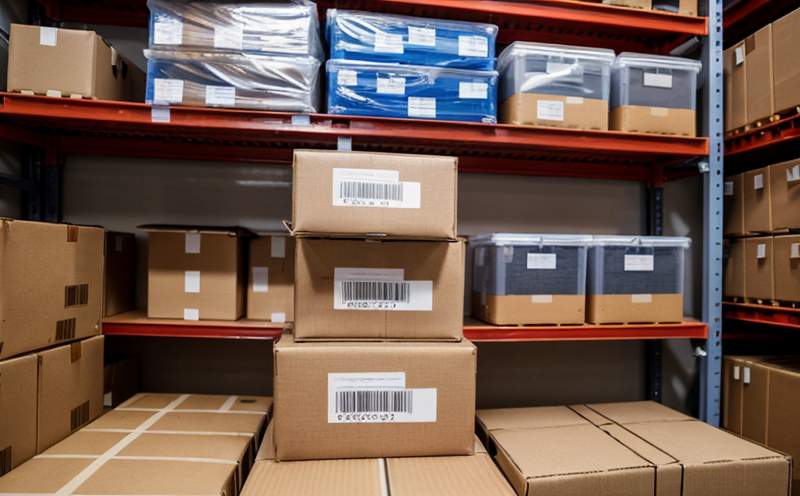ISO 17368 Supply Chain Labeling Documentation Testing
The ISO 17368 standard provides a framework to ensure that supply chain labeling and documentation are accurate, consistent, and compliant with international regulations. This service focuses on the rigorous testing of labels used in global logistics and transportation systems. The objective is to verify the integrity and readability of these labels throughout the entire supply chain.
Supply chain labels play a critical role in ensuring that goods move efficiently from manufacturer to consumer, while maintaining safety standards and regulatory compliance. These labels must be readable across diverse environments, including various climate conditions, lighting, and physical impacts during shipping and handling. This service ensures that the label design meets these stringent requirements.
The testing process involves multiple stages to simulate real-world scenarios encountered in the supply chain. Labels are subjected to environmental stress tests such as exposure to extreme temperatures, humidity, and light. Additionally, the readability of the text is assessed under various lighting conditions using specialized equipment that mimics natural and artificial sources.
Instrumentation used for this testing includes high-resolution scanners capable of reading barcodes, QR codes, and other data carriers from a variety of angles. The labels are also subjected to abrasion tests to ensure they remain legible even after repeated handling. Compliance with ISO 17368 ensures that the label information is readily accessible at each point in the supply chain.
The service covers not only the physical aspects of the label but also the underlying documentation supporting it. This includes verifying that all required fields are present and accurate, ensuring compliance with international standards such as ISO 17368:2020. The process involves a comprehensive review of the document's structure, content, and adherence to regulatory guidelines.
By adhering to this standard, organizations can ensure that their supply chain operations are transparent, efficient, and compliant with international regulations. This not only reduces the risk of non-compliance penalties but also enhances customer trust and satisfaction. The service provides a robust framework for validating the integrity and readability of labels and documentation across all stages of the supply chain.
Why It Matters
Supply chain labeling and documentation are pivotal in ensuring that goods move seamlessly through international logistics systems. The ISO 17368 standard is crucial for several reasons, including enhancing operational efficiency, improving supply chain transparency, and ensuring regulatory compliance.
- Enhanced Efficiency: Accurate labeling ensures that goods are correctly identified at every point in the supply chain. This minimizes errors and reduces delays, thereby increasing overall efficiency.
- Transparency: Compliance with ISO 17368 standards provides a clear and transparent record of each shipment's journey, from production to delivery. This transparency is vital for stakeholders involved in the supply chain.
- Regulatory Compliance: Adherence to international standards ensures that organizations meet all legal requirements imposed by various countries. This avoids potential fines and penalties associated with non-compliance.
The global nature of modern supply chains means that a single error in labeling or documentation can have far-reaching consequences, affecting not only the immediate shipment but also relationships with international partners. By ensuring compliance with ISO 17368, organizations demonstrate their commitment to maintaining high standards of quality and reliability.
The service provided ensures that labels are not only visually appealing and readable under various conditions but also contain accurate information critical for the safe handling and transport of goods. This is particularly important in industries such as pharmaceuticals, food and beverage, and electronics, where errors can have severe consequences.
Benefits
- Enhanced Readability: Labels tested against ISO 17368 ensure that they remain readable under a wide range of environmental conditions, including extreme temperatures and lighting.
- Abrasion Resistance: The labels are designed to withstand repeated handling and physical impacts without losing their legibility or integrity.
- Compliance Assurance: Compliance with ISO 17368 ensures that all required information is present and accurate, thereby avoiding non-compliance issues.
- Global Acceptance: Labels meeting these standards are accepted worldwide, reducing the risk of delays at international borders.
The service also offers several additional benefits beyond the immediate compliance requirements. It helps organizations to build a reputation for reliability and quality, which can be crucial in maintaining customer trust and loyalty. Moreover, it supports continuous improvement in supply chain management practices, leading to operational efficiencies and cost savings.
Environmental and Sustainability Contributions
- Eco-friendly Materials: The service ensures that labels are made from environmentally friendly materials, reducing the environmental impact of label production.
- Energy Efficiency: By ensuring that labels remain readable under various conditions, organizations can reduce energy consumption in their supply chain operations.
The ISO 17368 standard is designed to minimize waste and promote sustainability throughout the supply chain. This includes reducing the amount of label material used while maintaining readability and compliance with international regulations. By adhering to these standards, organizations contribute positively to environmental conservation efforts.
Incorporating sustainable practices into labeling and documentation not only benefits the environment but also aligns with growing consumer demands for eco-friendly products and services. This service helps organizations to meet these expectations while maintaining operational efficiency and regulatory compliance.





